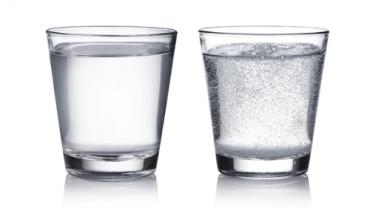
As practitioners, we know proper hydration is fundamental to health and healing, but few people drink adequate amounts of water throughout the day. With the rise in alternatives – milk, juice, flavored waters, carbonated beverages and trendy options such as kombucha – we are not seeing an improvement in people’s general hydration. Faced with an overwhelming plethora of beverage options, many people have developed preferences for flavored beverages and a distaste for pure water.
Flavored, unsweetened, carbonated water beverages are quickly becoming a recommended solution for the hydration crisis because these alternatives provide water while still satisfying a desire for something a bit more flavorful. Unfortunately, these beverages don’t do much for hydration because the average adult would have to consume 5 or more 12oz cans of a carbonated beverage to fulfill their hydration needs. (Still, though, these beverages do contribute to total water intake.) However, questions have been raised regarding the healthfulness of carbonation, whether it poses any health risks, and if so, do these risks outweigh the alternative for those who regularly consume carbonated beverages – namely, dehydration.
Carbonated water is a pressurized mixture of carbon dioxide gas and filtered water. Some natural sparkling mineral water is naturally carbonated as carbon dioxide is absorbed from the ground, but most carbonated beverages have been artificially carbonated by pumping carbon dioxide gas into water at a very high pressure and sealing to keep the pressure high, which ensures the carbonation persists. Many carbonated drinks also contain some form of sodium and/or acid (citric acid, phosphoric acid, etc.) which gives it the traditional “bite.”
So, is regular consumption of carbon dioxide-infused water healthful?
Acidity
The first concern raised about carbonated beverages is their acidity. When carbon dioxide and water mix, they react to produce carbonic acid, which also gives carbonated beverages their burning or biting sensation. Carbonic acid reduces the pH of the beverage. The pH of pure water is usually around neutral (7.0). In comparison, S. Pellegrino®, sparkling natural mineral water, has a pH of 4.96, Perrier® carbonated mineral water, a pH of 5.25, and Schweppes® Tonic water, 2.54. One of the greatest health concerns of acidic beverages is dental corrosion. Surface enamel begins to demineralize as the pH of oral environment drops below 5.5. Once the pH drops below 3.0, the erosive potential increases 10-fold.
Weight Gain
An animal study showed the possibility of carbonated beverages contributing to weight gain and obesity by modulating appetite-regulating hormones. When 20 rats consumed gaseous carbonated beverages over one year, they gained weight faster than the control rats given regular degassed carbonated beverages (flat) or tap water. Ghrelin was measured in test and control groups and found to be elevated among those consuming gaseous carbonated beverages, resulting in greater food intake. A parallel human study showed the same results. The strength of this study was that by comparing gaseous and degassed carbonated drinks, the causative factor could be identified as gaseous carbon dioxide, which is not present in degassed carbonated drinks.
Type 2 Diabetes
A few studies have shown alarming and intriguing metabolic reactions to carbonated water, potentially increasing risk for developing type 2 diabetes. In the 1950s and 60s, an observation was made that many individuals with type 2 diabetes frequently drank carbonated mineral water before their diagnosis. This observation led to studies that showed that administering gaseous carbon dioxide into the stomach increased the carbon dioxide tension in the hepatic portal vein and liver. Elevated hepatic tension hindered glycogenolysis, which induced hypoglycemia. The body then had to produce glucose through alternative means, which are not as well regulated and often led to hyperglycemia. Eventually, type 2 diabetes developed.
Physiological Stress
The consumption of carbonated water appears to also trigger cardiac and sympathetic activity, signaling a temporary state of stress. Multiple regression analysis of 19 healthy young women showed the consumption of carbonated water increased heart rate, and either increased sympathetic activity or decreased parasympathetic activity.
Although it may seem advantageous to recommend carbonated water as an option for patients to be adequately hydrated, there are drawbacks to encouraging habitual consumption of these beverages. Increased acidity, tooth decay, weight gain, blood sugar dysregulation, and physiological stress are just a few of the potential concerns associated with regular consumption of carbonated beverages.
By Nicole Spear, MS, CNS
Related Nutrient Roundtable: Weight Loss
Related Clinical Rounds: Adrenal Physiology and the Stress Response